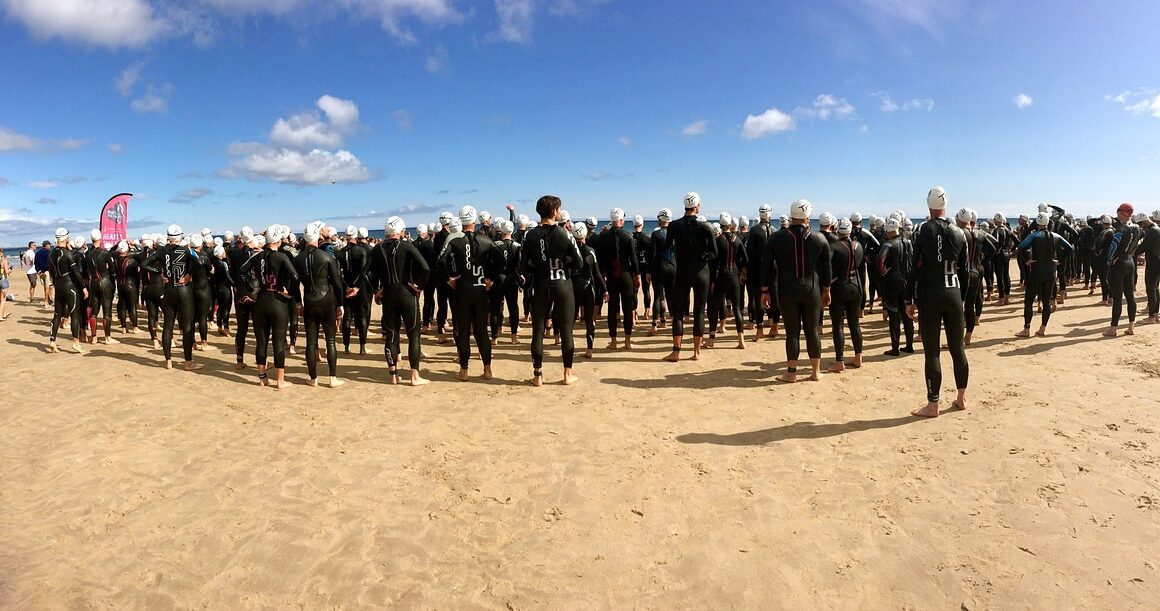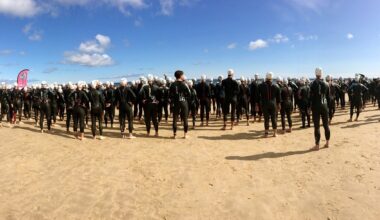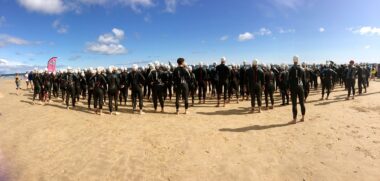Group Training: Boost Your Triathlon Motivation Through Community
Joining a group training session can significantly enhance your motivation to engage in triathlon training. The collective energy and shared goals of a group can push individual participants to train harder and more consistently. This communal approach to endurance sports creates a dynamic environment where peers act as both supporters and challengers. Moreover, the accountability that comes from training alongside others can lead to more disciplined workouts. Everyone in the group tends to hold each other accountable, which fosters a culture of commitment and encouragement. Furthermore, sharing training experiences and discussing individual challenges among peers can create a support network. This network motivates each member to overcome obstacles that may hinder their progress in preparation for an upcoming triathlon. It is not merely about competing against each other but sharing knowledge, enthusiasm, and insights. Individuals in the group can exchange ideas, tips, and strategies for improvement. This collaboration can result in a more enjoyable training journey for everyone involved, enhancing the endurance sport experience through meaningful interactions and relationships. By engaging with a community, training transforms from a solitary pursuit into a shared adventure that everyone cherishes.
Social Bonds and Team Spirit
Another significant advantage of group training lies in the social bonds formed among participants. As athletes spend more time together, they share triumphs and defeats, creating lasting friendships. These social bonds reinforce the sense of belonging to a community and contribute to motivation. The relationships formed during training can extend beyond workout sessions, leading to a support system off the track and in daily life. This aspect of team spirit encourages individuals to show up for each other’s workouts, pushing everyone to maintain commitments. Additionally, when participants see friends overcoming challenges in triathlon training, it inspires them to rise and tackle their hurdles, hence fostering a spirit of camaraderie. The medication of competition and collaboration gives rise to a non-judgmental environment where all abilities feel welcome. Everyone encourages each other, becoming cheerleaders in one another’s journeys. The synergy created within a group can lead to notable improvements in performance, as individuals draw strength from the community. Celebrating achievements together, whether big or small, further solidifies these bonds. Magically, the group’s accomplishments become individual victories, motivating each member to reach their fullest potential as a result.
Structured Training Plans
Group training often incorporates structured training plans that benefit participants immensely. When training within a group, established coaches usually develop these plans, ensuring that they cater to the needs of all members. These structured routines often encompass various aspects of triathlon training, including swimming, cycling, and running. Additionally, such plans are tailored to different levels of fitness and experience. The schedules provide clear outlines of what each training session entails, allowing participants to track their progress more effectively. Regular assessments and modifications to the plan prompt athletes to push their limits continually. A well-organized training schedule, coupled with the motivation of fellow group members, ensures that equipment and skills are consistently improved. Some groups may even incorporate fitness retreats or workshops, enhancing the overall experience while promoting education about triathlons. Group training prevents stagnation of fitness levels, encouraging everyone to pursue specific goals collectively. This accountability significantly cuts down on individual excuses for skipping workouts or slacking off. Participants who might train alone will find the drive to complete their training when surrounded by others working towards similar objectives. The synergy within the team is the key to staying on track and motivated.
The diversity of skill levels in group training also enhances the overall motivational experience. In any given session, you may find novices training with seasoned triathletes. The seasoned athletes have much to share, filling in the gaps left by personal experiences through encouragement and pointers on technique. Beginners often feel inspired by observing those with more experience, suddenly realizing what is attainable with consistency and dedication. This diversity creates a sense of inclusiveness, drawing in individuals who may have otherwise felt intimidated by the sport. Seeing others push their limits serves as a beautiful reminder that progress comes in many forms. Experience levels intermingling contribute to enriched discussions. From sharing tips to exchanging experiences in racing, everyone grows. Both categories of participants can benefit, as the seasoned athletes refine their methods by explaining techniques and strategies. This collaboration blends motivation with a sense of purpose – helping others succeed in their journey. Moreover, seasoned participants often recall their struggles during early training stages, allowing them to connect deeply with newer members. Understanding each other’s backgrounds fosters strong bonds while accentuating individual improvements, reinforcing every athlete’s commitment to their training and growth.
Setting goals is another important aspect of group training that enhances motivation. When part of a training group, participants are encouraged to discuss and establish both individual and group goals. These objectives serve as benchmarks to keep spirits high and foster commitment to the workout routine. As a collective set of goals, group members can support and motivate one another towards achievements. Furthermore, tracking progress toward these goals provides feedback which is crucial in motivating participants to persist. Breakthrough moments shared among members can often reignite enthusiasm when the journey feels long or particularly tough. Celebrating these milestones reinforces the collective identity and commitment to the sport. In many training groups, the focus also includes participating in local races together, which adds an extra layer of motivation in training sessions. Competing as a team ignites a unique sense of pride, pushing individuals toward performing at their best. The excitement leading up to a race fosters connection, camaraderie, and action. Individuals strive to make their training worthy of race day performances, leading to well-prepared athletes who feel supported every step of the way. Establishing and achieving goals becomes a collective journey, promoting healthy competition in a motivating manner.
Community support through group training extends far beyond the structured workout sessions. Team events, such as charity runs and local races, provide rewarding opportunities to engage with the community, helping participants to feel as though they are part of something bigger. These opportunities help broaden social networks and create a supportive environment that fosters growth and encouragement via shared charitable purposes. Active involvement in community projects brings additional layers of fulfillment, strengthening bonds among participants. The connections fostered during training sessions often extend to sharing life experiences outside of triathlon activities, allowing friendships to bloom. As friendships grow, the motivation to train intensifies, with participants more likely to push each other beyond their limits. Engaging in collective events brings out the team spirit, often setting goals as a group. By supporting each other through challenges, athletes build resilience and elevate one another’s experiences. Celebrating not only personal victories but also uniting as teams during events becomes gratifying, cementing the deep connections fostered through group training. The network formed is enriching, promoting active lifestyles while ensuring no member feels isolated in their journey towards triathlon excellence.
Finally, the impact of experienced coaches cannot be overlooked in the context of group training. Many training groups work with knowledgeable instructors, offering valuable insights into triathlon techniques and preparation. These coaches bring professional guidance and enhance the overall quality of training sessions significantly. Their expertise can lead to improved performance in all three triathlon disciplines. Additionally, professional coaches can identify individual strengths and weaknesses rapidly, providing specialized advice tailored to specific needs. The individual attention within a group environment allows for focused feedback for each member, enabling improvement in techniques and strategies effectively. Participants can then replicate the suggested changes during practice, gaining confidence leading to their race day performances. Additionally, regular interaction with a coach helps foster a strong sense of teamwork and communication within the group. By collaborating with a professional, everyone develops a deeper connection to the sport, resulting in improved confidence, discipline, as well as camaraderie. Completing a triathlon becomes a collective journey rather than an individual task. Participants encouraging each other’s achievements gradually evolve not only as athletes but as a supportive community dedicated to success.





